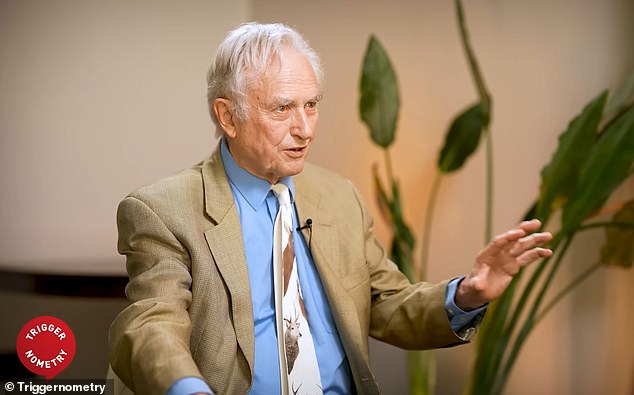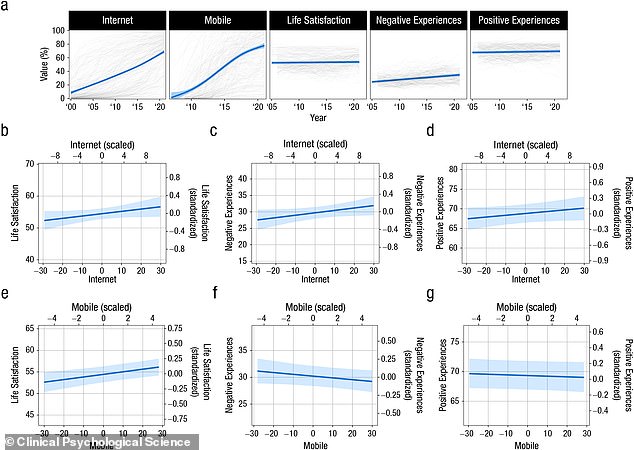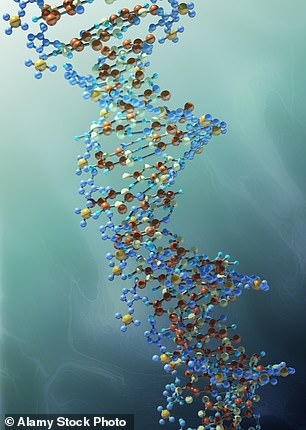Rising cases of mental illness in developed countries could be attributed to the “amazing speed” of technological change, according to biologist Richard Dawkins.
The iconic British author and evolutionary scientist, 83, theorized that we evolve too slowly to keep up with our environment, creating an imbalance that disrupts our sense of well-being.
He floated the theory in a podcast appearance on Sunday, echoing years of research that has linked social media use to depression among young people, among other modern ailments.
“Many people are concerned that the pace of change is such that we are no longer well adapted to live in it,” Dawkins told podcast listeners. ‘This is a concern.’
Despite these seemingly common sense concerns, the link between technological progress and human well-being is debated – with one study led by Oxford’s Internet Institute finding no ‘smoking gun’ linking the two.

Rising cases of mental illness in developed countries could be attributed to their “incredible rate” of technological change, according to biologist Richard Dawkins (above).

The iconic British author and evolutionary scientist, 83, floated the theory on the TRIGGERnometry podcast on Sunday – echoing years of research that has linked Big Tech and social media use to depression among young people, among other modern ailments
“Certainly the rate at which we’re evolving genetically is small compared to the rate at which we’re evolving non-genetically, culturally,” Dawkins told the hosts of the TRIGGERnometry podcast.
“And much of the mental illness that afflicts people may be because we are in a constantly changing and unpredictable environment,” the biologist added, “in a way that our ancestors were not.”
But Dawkins — who has fostered a embattled relationship with cultural trends about gender, religion and other political topics he sees as at odds with evidence-based scientific arguments — was reticent to fully endorse the theory.
“Actually, I think it’s amazing how resilient we are,” said the author of such landmark books as The Selfish Gene (1976) and The God Delusion (2006).
“We seem, most of us, to be able to cope pretty well with the incredible speed of change in my lifetime,” Dawkins said.
A large-scale international study published last November in the journal Clinical Psychological Science, which used data from two million people between the ages of 15 and 89, seems to fuel Dawkins’ optimism.
The researchers, whose cohort of two million individuals spanned 168 countries, found smaller associations than would be expected if the Internet or online social media caused widespread psychological harm.
Professor Andrew Przybylski, from the Oxford Internet Institute, who led the study also published a similar study on Facebook usage last year.
In that study, published in the journal Royal Society Open Science, he and his co-authors used data on rates of anxiety, depression and self-harm from 2000-2019 in around 200 countries.
Well-being was assessed using data from face-to-face and telephone surveys of local interviewers, and mental health was assessed using statistical assessments of depression, anxiety disorders and self-harm.
“We looked very hard for a ‘smoking gun’ connecting technology and well-being, and we didn’t find it,” said Przybylski.

A large-scale study published last November, using data from two million people between the ages of 15 and 89, appears to bolster Dawkins’ case for optimism. It found smaller associations than expected if the Internet was causing widespread psychological harm

“Actually, I think it’s amazing how resilient we are,” said Dawkins, author of such landmark books as The Selfish Gene (1976). “Most of us seem to be coping pretty well with the incredible speed of change in my lifetime”
“The popular idea that the Internet and mobile phones have a negative effect on well-being and mental health is not likely to be accurate,” says Przybylski.
“It’s certainly possible that there are smaller, more important things going on, but any sweeping claims about the negative effects of the internet on a global scale should be treated with a very high degree of skepticism,” the Oxford academic concluded.
His research, however, runs counter to many studies that purport to show that social media and this confusing era of technological change have worsened the mental health of middle-aged and millennials as well as young adults.

Dawkins said that human genetic evolution is not happening as fast as cultural evolution. Above is a model of a DNA strand
In his podcast appearance, Dawkins expressed more direct concerns about other aspects of human technology’s impact on evolution: climate change and basic self-preservation in the face of a new dark age.
“The Internet is a big change, it’s a huge change,” he said. “We’ve adapted to it with astonishing speed.”
“if we lost the electricity, if we suddenly lost the technology we’re used to,” Dawkins worried that humanity might not “start” to adapt in time, without massive social upheaval and death.
The biologist had similar views on the warming of the planet due to climate change, but cautioned that this was not his area of expertise.
“It’s probably a dangerous problem,” Dawkins told the podcast, “and one that needs to be sorted out.”
But as someone who has studied evolution in a wide variety of wildlife over his long career, he spoke more forcefully about humanity’s impact on other life on Earth.
“Man-made extinction,” he said, “is just as bad as the others. I think it’s tragic.’
#Renowned #scientist #Richard #Dawkins #uncovers #fascinating #theory #Wests #mental #health #crisis